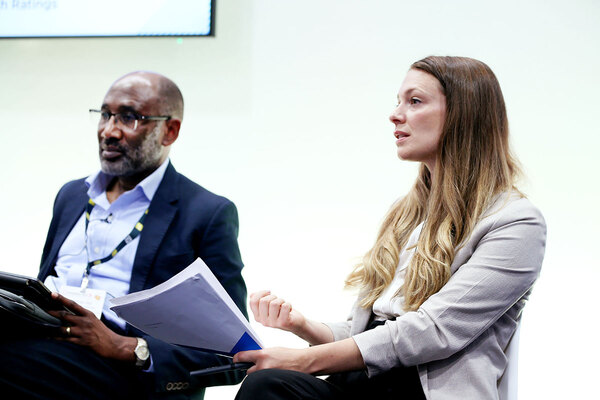You are viewing 1 of your 1 free articles
Dispatches from Housing 2021: day three
A daily round-up of the most important headlines from day three of the Housing 2021 conference
And there we have it. Europe’s biggest housing conference has closed. After a two-year gap forced by the pandemic, the past three days feel like they have gone in a flash.
It has been refreshing to see the sector come together again. And while the crowd may have thinned slightly on day three, the agenda was still packed with a number of enlightening sessions.
From development, to levelling-up, to regulation, the final day had it all, culminating in an appearance – albeit by video link – of the housing secretary.
Executive pay rears its head again
Robert Jenrick was not afraid to ruffle feathers during his keynote speech on Thursday afternoon, taking the opportunity to once again criticise the pay of housing association chief executives.
“I know that the vast majority of you do a very good job for your residents and I appreciate all of your efforts.
There is unfortunately a minority who fall below those standards and give the good name of the sector a bad image,” he said in reference to the recent ITV News investigation into poor housing conditions within some social homes.
And bigger salaries, Mr Jenrick said, symbolise the sector’s move away from what he called the ideals of those who led the sector previously.
“In some cases, we’ve also seen excessive executive pay that jars with the social mission behind the sector’s foundation,” he said, adding that he hopes the upcoming overhaul to consumer regulation will lead to a “shift in culture towards the renewal of the ideals that inspired the pioneers of the sector”.
Beyond this, the housing secretary’s speech included a number of interesting titbits, including a commitment to withdraw the government’s consolidated advice note, which dragged hundreds of low-rise buildings into the EWS1 crisis, within the “coming weeks”.Mr Jenrick also hinted at an upcoming announcement about the new Infrastructure Levy, which is part of the government’s planning reforms.
He said that the levy will be “set by a local authority, levied by a local authority and the receipts flow to that local authority, with great flexibility over how they can spend it”.
The word “flexibility” may have made some in the audience nervous, with many already warning that a single Infrastructure Levy could result in less money from developer contributions being spent on affordable housing.
Nagging for change
Riverside’s chief executive Carol Matthews displayed a rare insight into what it takes to be at the top of the housing sector to delegates at the conference on Wednesday afternoon: they have to be exceptionally good at nagging.
Speaking to the audience with directness during the session on regulation and social housing, Ms Matthews noted that, in her opinion, trying to achieve organisational change is, frankly, really damned hard.
“You lot talk about this stuff as if it is easy. Oh my! Organisational learning is absolutely the toughest nut to crack,” she said, noting the various methods employed to help individuals adopt new policies. “We’ve done nagging, I’m really good at nagging, we’ve done complaining, we’ve done the inquiry [with staff], and now we’ve done peer reviews.”
With Fiona MacGregor and Richard Blakeway also on the panel, Ms Matthews’ thoughts could lead to a novel change in approach to how the regulator and the ombudsman sort out underperforming housing providers.
Could it lead to a new line in every in-depth assessment or maladministration judgement, perhaps, in which a number is added next to the sentence “number of times asked to sort out”?
Housing associations could be asked to go and sit on the naughty step if this number exceeds five or six.
Should a V2 be worn as a badge of honour?
Should housing associations start wearing ‘V2’ viability ratings as a “badge of honour”? That was the seemingly controversial question asked during a panel session on new funding models and attracting institutional investment into the sector.
The panel included representatives from Homes England and Civitas and involved a discussion about how housing associations need to be more “innovative” in their funding models in the climate of limited government grant, net zero and building safety costs.
One audience member from GreenSquareAccord pointed out that pursuing more innovative funding models in order to develop new homes will inevitably mean “we’re going to see more people probably moving to a V2 rating simply because we want to innovate”, referencing the Regulator of Social Housing’s second-highest rating for financial viability.
“How important, genuinely, is it? Do we wear the V2 rating as a badge of honour?” the audience member asked, while noting that some local authorities say they will only work with housing associations that have the top G1/V1 rating.
The session’s chair, A2Dominion’s interim chief executive Anne Waterhouse, said that her organisation “is really proud to have the V2”.
She said there needs to be an “education” around what V2 actually means, which is that “the organisation is operating in an environment where there are risks but that it is managing those risks effectively”.
Speaker nerves
“Hands up who gets nervous before speaking in public,” said PCH’s Carl Brazier, when speaking on a panel session about levelling-up.
A wave of hands shot right up in the air following the question.
It seems that Mr Brazier is in good company when it comes to feeling uncomfortable on stage. With a quip that hopefully he “won’t have to take any questions”, he began to tackle one of the key political questions of the conference: what levelling-up really means, and whether it is happening throughout the country.
For him and others at the session, levelling-up is about the economic growth of often overlooked areas of the country.
But more importantly, it is about people. “Support for people’s health and well-being is the other side of the equation. The ‘people’s side’ of the equation needs equal support,” he said.And has it taken effect? Well, it will be a marathon, not a sprint.
Ben Denton, managing director of Legal & General Affordable Homes, said: “Where do we want to be in 10 years’ time? I’ll be honest, will everything be levelled up and perfect? It won’t be. I think people need to be aware that things won’t ever be completely levelled up.”
Lucie Heath, chief reporter, and Tim Clark, reporter
Sign up for our Week in Housing newsletter
Already have an account? Click here to manage your newsletters












